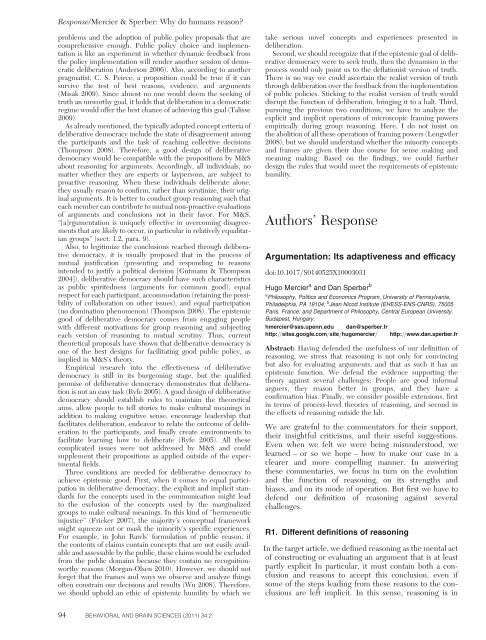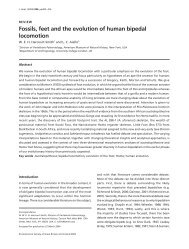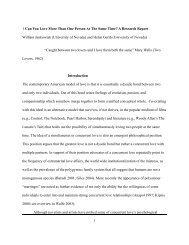Why do humans reason? Arguments for an argumentative theory
Why do humans reason? Arguments for an argumentative theory
Why do humans reason? Arguments for an argumentative theory
You also want an ePaper? Increase the reach of your titles
YUMPU automatically turns print PDFs into web optimized ePapers that Google loves.
Response/Mercier & Sperber: <strong>Why</strong> <strong>do</strong> <strong>hum<strong>an</strong>s</strong> <strong>reason</strong>?problems <strong>an</strong>d the a<strong>do</strong>ption of public policy proposals that arecomprehensive enough. Public policy choice <strong>an</strong>d implementationis like <strong>an</strong> experiment in whether dynamic feedback fromthe policy implementation will render <strong>an</strong>other session of democraticdeliberation (Anderson 2006). Also, according to <strong>an</strong>otherpragmatist, C. S. Peirce, a proposition could be true if it c<strong>an</strong>survive the test of best <strong>reason</strong>s, evidence, <strong>an</strong>d arguments(Misak 2009). Since almost no one would deem the seeking oftruth <strong>an</strong> unworthy goal, it holds that deliberation in a democraticregime would offer the best ch<strong>an</strong>ce of achieving this goal (Talisse2009).As already mentioned, the typically a<strong>do</strong>pted concept criteria ofdeliberative democracy include the state of disagreement amongthe particip<strong>an</strong>ts <strong>an</strong>d the task of reaching collective decisions(Thompson 2008). There<strong>for</strong>e, a good design of deliberativedemocracy would be compatible with the propositions by M&Sabout <strong>reason</strong>ing <strong>for</strong> arguments. Accordingly, all individuals, nomatter whether they are experts or laypersons, are subject toproactive <strong>reason</strong>ing. When these individuals deliberate alone,they usually <strong>reason</strong> to confirm, rather th<strong>an</strong> scrutinize, their originalarguments. It is better to conduct group <strong>reason</strong>ing such thateach member c<strong>an</strong> contribute to mutual non-proactive evaluationsof arguments <strong>an</strong>d conclusions not in their favor. For M&S,“[a]rgumentation is uniquely effective in overcoming disagreementsthat are likely to occur, in particular in relatively equalitari<strong>an</strong>groups” (sect. 1.2, para. 9).Also, to legitimize the conclusions reached through deliberativedemocracy, it is usually proposed that in the process ofmutual justification (presenting <strong>an</strong>d responding to <strong>reason</strong>sintended to justify a political decision [Gutm<strong>an</strong>n & Thompson2004]), deliberative democracy should have such characteristicsas public spiritedness (arguments <strong>for</strong> common good), equalrespect <strong>for</strong> each particip<strong>an</strong>t, accommodation (retaining the possibilityof collaboration on other issues), <strong>an</strong>d equal participation(no <strong>do</strong>mination phenomenon) (Thompson 2008). The epistemicgood of deliberative democracy comes from engaging peoplewith different motivations <strong>for</strong> group <strong>reason</strong>ing <strong>an</strong>d subjectingeach version of <strong>reason</strong>ing to mutual scrutiny. Thus, currenttheoretical proposals have shown that deliberative democracy isone of the best designs <strong>for</strong> facilitating good public policy, asimplied in M&S’s <strong>theory</strong>.Empirical research into the effectiveness of deliberativedemocracy is still in its burgeoning stage, but the qualifiedpromise of deliberative democracy demonstrates that deliberationis not <strong>an</strong> easy task (Ryfe 2005). A good design of deliberativedemocracy should establish rules to maintain the theoreticalaims, allow people to tell stories to make cultural me<strong>an</strong>ings inaddition to making cognitive sense, encourage leadership thatfacilitates deliberation, endeavor to relate the outcome of deliberationto the particip<strong>an</strong>ts, <strong>an</strong>d finally create environments tofacilitate learning how to deliberate (Ryfe 2005). All thesecomplicated issues were not addressed by M&S <strong>an</strong>d couldsupplement their propositions as applied outside of the experimentalfields.Three conditions are needed <strong>for</strong> deliberative democracy toachieve epistemic good. First, when it comes to equal participationin deliberative democracy, the explicit <strong>an</strong>d implicit st<strong>an</strong>dards<strong>for</strong> the concepts used in the communication might leadto the exclusion of the concepts used by the marginalizedgroups to make cultural me<strong>an</strong>ings. In this kind of “hermeneuticinjustice” (Fricker 2007), the majority’s conceptual frameworkmight squeeze out or mask the minority’s specific experiences.For example, in John Rawls’ <strong>for</strong>mulation of public <strong>reason</strong>, ifthe contents of claims contain concepts that are not easily available<strong>an</strong>d assessable by the public, these claims would be excludedfrom the public <strong>do</strong>mains because they contain no recognitionworthy<strong>reason</strong>s (Morg<strong>an</strong>-Olsen 2010). However, we should not<strong>for</strong>get that the frames <strong>an</strong>d ways we observe <strong>an</strong>d <strong>an</strong>alyze thingsoften constrain our decisions <strong>an</strong>d results (Wu 2008). There<strong>for</strong>e,we should uphold <strong>an</strong> ethic of epistemic humility by which wetake serious novel concepts <strong>an</strong>d experiences presented indeliberation.Second, we should recognize that if the epistemic goal of deliberativedemocracy were to seek truth, then the dynamism in theprocess would only point us to the deflationist version of truth.There is no way we could ascertain the realist version of truththrough deliberation over the feedback from the implementationof public policies. Sticking to the realist version of truth woulddisrupt the function of deliberation, bringing it to a halt. Third,pursuing the previous two conditions, we have to <strong>an</strong>alyze theexplicit <strong>an</strong>d implicit operations of microscopic framing powersempirically during group <strong>reason</strong>ing. Here, I <strong>do</strong> not insist onthe abolition of all these operations of framing powers (Lengwiler2008), but we should underst<strong>an</strong>d whether the minority concepts<strong>an</strong>d frames are given their due course <strong>for</strong> sense making <strong>an</strong>dme<strong>an</strong>ing making. Based on the findings, we could furtherdesign the rules that would meet the requirements of epistemichumility.Authors’ ResponseArgumentation: Its adaptiveness <strong>an</strong>d efficacy<strong>do</strong>i:10.1017/S0140525X10003031Hugo Mercier a <strong>an</strong>d D<strong>an</strong> Sperber ba Philosophy, Politics <strong>an</strong>d Economics Program, University of Pennsylv<strong>an</strong>ia,Philadelphia, PA 19104; b Je<strong>an</strong> Nicod Institute (EHESS-ENS-CNRS), 75005Paris, Fr<strong>an</strong>ce; <strong>an</strong>d Department of Philosophy, Central Europe<strong>an</strong> University,Budapest, Hungary.hmercier@sas.upenn.edu d<strong>an</strong>@sperber.frhttp://sites.google.com/site/hugomercier/ http://www.d<strong>an</strong>.sperber.frAbstract: Having defended the usefulness of our definition of<strong>reason</strong>ing, we stress that <strong>reason</strong>ing is not only <strong>for</strong> convincingbut also <strong>for</strong> evaluating arguments, <strong>an</strong>d that as such it has <strong>an</strong>epistemic function. We defend the evidence supporting the<strong>theory</strong> against several challenges: People are good in<strong>for</strong>malarguers, they <strong>reason</strong> better in groups, <strong>an</strong>d they have aconfirmation bias. Finally, we consider possible extensions, firstin terms of process-level theories of <strong>reason</strong>ing, <strong>an</strong>d second inthe effects of <strong>reason</strong>ing outside the lab.We are grateful to the commentators <strong>for</strong> their support,their insightful criticisms, <strong>an</strong>d their useful suggestions.Even when we felt we were being misunderstood, welearned – or so we hope – how to make our case in aclearer <strong>an</strong>d more compelling m<strong>an</strong>ner. In <strong>an</strong>sweringthese commentaries, we focus in turn on the evolution<strong>an</strong>d the function of <strong>reason</strong>ing, on its strengths <strong>an</strong>dbiases, <strong>an</strong>d on its mode of operation. But first we have todefend our definition of <strong>reason</strong>ing against severalchallenges.R1. Different definitions of <strong>reason</strong>ingIn the target article, we defined <strong>reason</strong>ing as the mental actof constructing or evaluating <strong>an</strong> argument that is at leastpartly explicit In particular, it must contain both a conclusion<strong>an</strong>d <strong>reason</strong>s to accept this conclusion, even ifsome of the steps leading from these <strong>reason</strong>s to the conclusionsare left implicit. In this sense, <strong>reason</strong>ing is in94 BEHAVIORAL AND BRAIN SCIENCES (2011) 34:2




